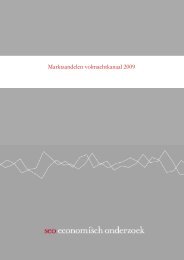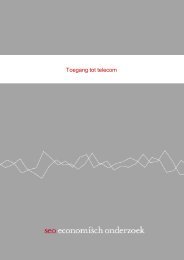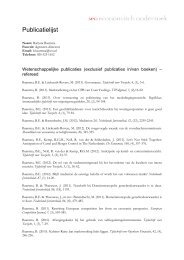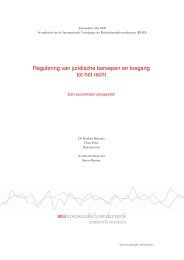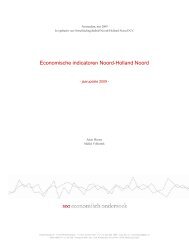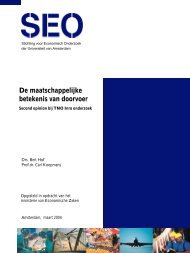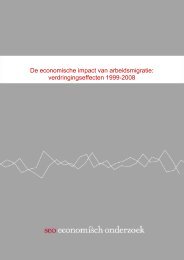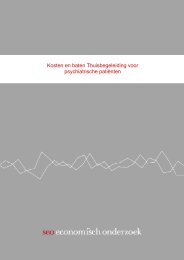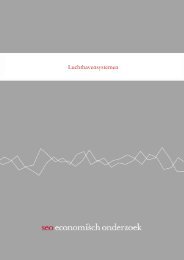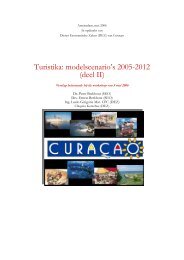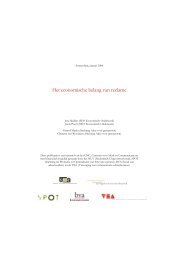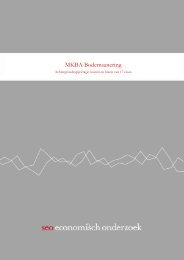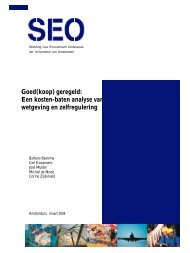Amsterdam, Netherlands - SEO Economisch Onderzoek
Amsterdam, Netherlands - SEO Economisch Onderzoek
Amsterdam, Netherlands - SEO Economisch Onderzoek
Create successful ePaper yourself
Turn your PDF publications into a flip-book with our unique Google optimized e-Paper software.
53% was financed from the WBSO. SenterNovem, an agency of the Ministry of EconomicAffairs, is responsible for allocating the WBSO funds to companies. Aside from executing theWBSO, SenterNovem is also responsible for a host of other innovation programmes. There is anadditional largely governmentally funded organization, Syntens, which is charged with givingpractical advice to entrepreneurs on the programmes run by SenterNovem (Syntens, 2009).The Innovation Letter White paper implied a shift in the Dutch governments’ innovation agendabut was still very generic in nature. Following a 2003 policy paper from the Advisory Council forScience and Technology Policy (AWT), the government has decided on a more tangible policy of‘backing the winners’ (AWT, 2003). The general idea is to concentrate the innovation funds onscience and industry fields in which the <strong>Netherlands</strong> has proven or potential strengths. Theresulting policy, put forward in the 2004 White paper Pieken in de Delta, implied a radical shiftfrom a policy of stimulating regions with the aim of achieving economic equality towards one ofexploiting regional comparative economic advantages. With this agenda, the government intendsto boost the competitive and dynamic nature of the Dutch economy as part of a strong andinnovative Europe (ibid: 17). A region-oriented innovation policy is a crucial part of thisambition, which means that the government supports regional innovation processes which haveregional implications (vocational education, technology transfers, stimulate starting entrepreneursand knowledge networks), as well as those that are internationally important (such as when aregion is an international ‘hot spot’ in a particular field). Many of the goals outlined in Pieken inde Delta aim to improve the cooperation between industry and HEIs. Examples are:• A strengthening of the link between the industry demand for knowledge andknowledge production at educational institutions (MinEZ, 2004: 40);• A more active entrepreneurial policy based on the potential of the knowledgeinfrastructure: spatial accommodation around universities (science parks, incubators,techno-startups) (ibid: 40);• Organizational clustering of overlapping economic activities: organization ofregional networks of companies and researchers around specific themes (ibid:40).In 2003, the Dutch government has established the Innovation Platform (Innovatieplatform), aconsultative body chaired by Prime Minister Balkenende which brings together key players in theknowledge economy: experts from politics, business, research and education. The platform ischarged with the task of creating the conditions, establishing the connections and developing thevision required to stimulate innovation and entrepreneurship in the <strong>Netherlands</strong>. It furthermoreaims to streamline the complex network of organizations in the innovation network. One of theinitiatives taken by the Innovation Platform has been the creation of a national innovation agenda,the Knowledge Investment Agenda 2006-2016 (Kennisinvesteringsagenda 2006-2016, KIA).KIA is an investment agenda directed towards the entire chain of education, research, innovationand entrepreneurship (Innovation Platform, 2006: 7). Like the Innovation Letter, it is based on theobservation that the <strong>Netherlands</strong> takes a strong position in Europe as a knowledge economy, buthas to invest more in research and innovation in order to keep up with other EU countries. Themain ambition presented in the KIA agenda is to develop the <strong>Netherlands</strong> into a top qualityknowledge society. However, reaching this ambition requires substantial investments ineducation, research and R&D. Private R&D expenditures in the <strong>Netherlands</strong> amount toapproximately 1% of GDP (OECD, 2006), while the Barcelona declaration states that this shouldbe 2%. Government spending on R&D is approximately 0.7% and needs to be increased to 1% tomeet the Barcelona goals. The total additional investments which are needed according to theKIA amount to EUR 3.5 to 6 billion for both the government and the private sector (SER, 2008:121). However, the business sector participating in the Innovation Platform has only committedto an additional EUR 200-400 million euro of R&D spending (ibid: 121). Hence, the main57



